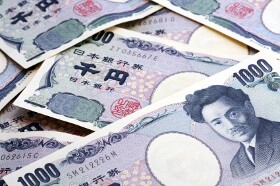The Japanese yen is trading mixed on foreign exchange markets on Tuesday as recent economic data pointed to tepid conditions, diminishing overall business confidence. With the coronavirus crippling the worldâs third-largest economy, policymakers are discussing a lot of ways to spur growth, including targeting the national sales tax.
According to the Cabinet Office, machinery orders rose 2.6% in January, up from the 11.9% decline in December. Analysts had projected a decrease of 1.6%. Year-over-year, machinery orders still dipped 0.3%.
Industrial production rose 1% in January, slightly down from the 1.2% advance in December. The market had penciled in a gain of just 0.8%. Capacity utilization surged from -0.4% in December to 1.1% in January, and experts expected a 0.5% slide.
On Monday, the Bank of Japan (BoJ) left its interest rates unchanged at -0.1%. Although the BoJ unleashed additional stimulus measures at its meeting, the central bank did not believe further rate cuts were necessary to combat the downward trend from Covid-19. The federal government is, however, looking at numerous stimulus measures to ensure Tokyo does not fall.
Over the last week, lawmakers have proposed temporarily eliminating the national sales tax, which was raised from 8% to 10% this past fall and contributed to the nationâs economic decline in the fourth quarter of 2019. Prime Minister Shinzo Abe and his ruling party are also planning to table a $282 billion supplementary budget to address the economic fallout from the outbreak.
Economy Minister Yasutoshi Nishimura told reporters at a cabinet meeting:
We’ll look into a wide range of options on tax, fiscal policy and deregulation.
Business confidence is tanking to levels comparable to those during the Lehman crisis. Now is not the time to think about how to balance the budget. Rather, it’s a time to do everything that’s necessary to keep the economy on a solid footing.
The Reuters Tankan Index, which examines business confidence, clocked in at multi-decade low of -20 in March. Last month, the index posted a reading of -5. It is widely expected that the sour business mood could curb capital spending until at least the summer and apply pressure to the government and central bank to spend more to offset the losses.
The USD/JPY currency pair rose 1.03% to 106.99, from an opening of 105.89, at 14:13 GMT on Tuesday. The EUR/JPY tumbled 0.53% to 117.78, from an opening of 118.40.
If you have any questions, comments, or opinions regarding the Japanese Yen, feel free to post them using the commentary form below.
